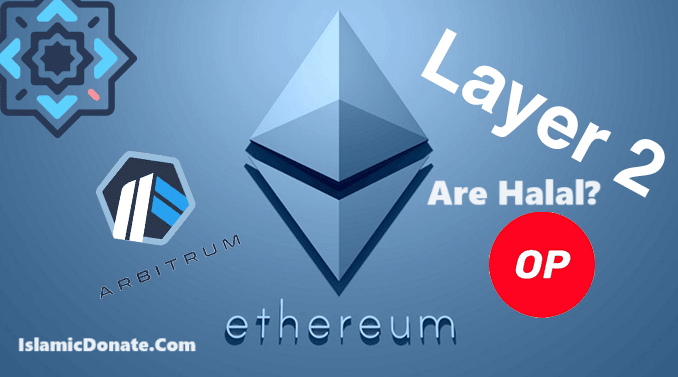What Are Ethereum Layer 2s, and Why Are They Important?
In the world of cryptocurrency, questions about halal and haram are more important than ever for Muslims who want to ensure their investments and transactions align with Islamic principles. Among the growing innovations in blockchain technology, Ethereum Layer 2s have gained significant attention. But what exactly are Layer 2s, and are they halal? Let’s explore this topic step by step.
Ethereum Layer 2 solutions are technologies built on top of the Ethereum blockchain to enhance its efficiency. Ethereum, as one of the largest blockchain networks, has experienced challenges like high transaction fees and slow processing times. To address these issues, Layer 2 solutions were created to take transactions off the main chain while maintaining its security and decentralization.
Examples of popular Ethereum Layer 2s include BASE, SUI, Optimism, Aptos, Arbitrum, and Avalanche. Each of these networks has its unique approach to improving blockchain scalability. For instance:
- BASE: Developed by Coinbase, BASE aims to make blockchain technology accessible for decentralized applications (dApps) while lowering costs.
- SUI: Designed for speed and efficiency, SUI focuses on enabling seamless transactions and better user experiences.
- Optimism and Arbitrum: Both networks utilize rollups, a method of batching transactions to reduce congestion and improve throughput.
- Avalanche: Known for its rapid transaction speed and low fees, Avalanche is often used for cross-chain solutions.
These Layer 2s aim to solve real-world problems like high fees and slow transaction speeds, making blockchain more practical and accessible.
Determining Halalness: What Makes a Blockchain Project Halal?
In Islam, financial activities must comply with Shariah principles to be considered halal. For cryptocurrencies and blockchain projects, this means they must avoid haram practices such as fraud, uncertainty (gharar), or interest (riba). To determine whether a project is halal, we can evaluate it using the following criteria:
- Clear and Ethical Objectives: The project should have a clear purpose that aligns with ethical values. For example, Layer 2 solutions like BASE and Arbitrum focus on improving blockchain technology to reduce fees and speed up transactions, both of which are legitimate and beneficial goals.
- Transparency: A project’s white paper should outline its goals, functionality, and technology in detail. It should also specify how it plans to create value without misleading investors.
- Real-World Utility: Projects must solve real-world problems or provide significant contributions to blockchain ecosystems. For instance, SUI’s focus on user experience and Optimism’s use of rollups directly address blockchain’s current limitations.
- No Haram Elements: The project must not involve gambling, interest-based lending, or any other activities prohibited by Islamic law.
When considering these principles, evaluating cryptocurrency projects becomes similar to evaluating companies in the stock market. For instance, when buying shares, you look for companies with solid goals, ethical practices, and competent teams. Similarly, in the crypto market, you assess projects based on their purpose, team, and technology.
How to Identify Halal Crypto Projects Step by Step
To ensure a project is halal, you can follow these steps:
- Examine the White Paper: The white paper provides an overview of the project’s goals and operations. Look for transparency and a clear mission that benefits society or the blockchain ecosystem.
- Research the Team: A qualified, ethical, and transparent team is essential. Check their professional backgrounds and track records to confirm they’re credible.
- Analyze the Technology: Ensure the project’s technology is legitimate and contributes to the blockchain’s functionality, such as improving scalability or reducing fees.
- Look for Shariah Certification: Some projects may have been reviewed by Islamic scholars for compliance with Shariah principles. While not mandatory, such certification can offer additional peace of mind.
- Avoid Speculative Behavior: Investments in crypto should not be made solely for speculative purposes. Instead, focus on projects with long-term value and real-world applications.
By following these steps, you can confidently identify halal projects and avoid haram elements in the cryptocurrency market.
Why We Support Ethereum Layer 2s for Donations
At Our Islamic Charity, we’ve reviewed Ethereum Layer 2 networks like BASE, SUI, Optimism, Aptos, Arbitrum, and Avalanche. We have access to many religious scholars and jurisprudential imams who have examined these projects one by one. Based on their evaluations, we have received Shariah Certification(Fatwa) for these projects, confirming their compliance with Islamic principles.
You can see the Ethereum Layer 2 addresses for Islamic charity donations here.
These solutions align with the criteria for halal projects:
- They have clear goals to improve blockchain technology.
- They provide real-world utility by making transactions faster and more affordable.
- They maintain transparency through detailed white papers and active developer communities.
Because these networks are on the right track and Shariah-certified, we support their use for donations. Donating through these Layer 2s is not only efficient but also ensures your contributions are used effectively for good causes. Whether you’re giving sadaqah or zakat, these networks provide a reliable and halal means to fulfill your intentions.
Let’s work together to leverage blockchain technology for the betterment of our ummah. Your donations, made through halal channels, can make a significant impact on those in need.



